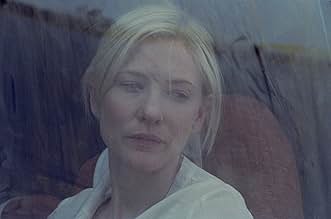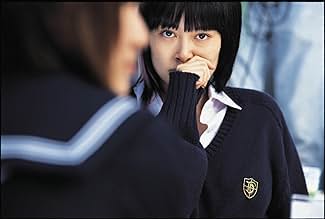Die Tragödie trifft ein Ehepaar im Urlaub in der marokkanischen Wüste und berührt eine ineinandergreifende Geschichte mit vier verschiedenen Familien.Die Tragödie trifft ein Ehepaar im Urlaub in der marokkanischen Wüste und berührt eine ineinandergreifende Geschichte mit vier verschiedenen Familien.Die Tragödie trifft ein Ehepaar im Urlaub in der marokkanischen Wüste und berührt eine ineinandergreifende Geschichte mit vier verschiedenen Familien.
- 1 Oscar gewonnen
- 45 Gewinne & 137 Nominierungen insgesamt
Empfohlene Bewertungen
If you like me, and so many others found 'Crash' (2005) offensively finger-wagging and dumb (its inherent message was: "Racism is bad."), Alejandro González Iñárritu's Babel will make it up to you with refreshing intelligence, respect for cultures and crisp acting. The plot outline is difficult to do justice in one sentence but much like Crash it explores culture clashes in life by navigating multiple interweaving story lines.
One of these is the story of the married couple Richard and Susan Jones, played by Pitt and Blanchett, who travel to Morocco 'to get away'. Theirs is a remarkably complex and bruised marriage at first but once the plot gradually unfolds the root of their problems becomes apparent. What is most remarkable about their storyline is that Brad Pitt actually emotes as an actor (although is he is grossly facilitated by heartfelt circumstances) and that Cate Blanchett regrettably never gets the chance to shine in her performance.
Cut to two young Arabic boys in the barren craggy hills of the outback of Morocco. They are brothers whom have just been given a rifle by their father to protect their goats and now they are having fun in learning how to fire the weapon. There is refreshing gritty honesty in the portrayal of this storyline from the dirt and heat on their clothes to the realistic dialogue and many heartrending moments due to the aforementioned. But be warned, this is no glossy or romantic depiction of North Africa...
Another storyline takes place in colourful Tokyo in Japan, detailing the teenage life of a deaf girl called Chieko. Hers is arguably the most compelling story especially in terms of sheer fun to be had. Being a teenage girl is hard enough and Chieko finds that her disability distances her from other people the boys she is interested in looks at her like she is a monster and frustrated and desperate to be loved, she indulges in teenage clichés like partying and drinking in the modern mess that is Tokyo. Here I found the single most vivid disco sequence completely sucking me in and not letting go until the fast-paced euphoria of Chieko finally subsided. There is absolute gold to be found in this Tokyo story.
Finally, the last storyline takes place in Mexico and the main character is a woman called Amelia (Adriana Barraza), who also happens to be Richard and Susan's nanny. When her son is getting married in Mexico and she cannot get a day off, she takes the kids with her across the border. Big mistake. I'm sure many will be able to identify with the sprawling surge of Mexican culture at the wedding and indeed the music and pace made this storyline both beautiful and enjoyable to follow. It is evident that director Alejandro González Iñárritu feels most at home in this setting and as a result, the story shines and its characters emote.
Although there is a lot to keep track of in 'Babel' owing to its many story lines, there is such a fluent and seamless intercutting of these segments that it is impossible not to be entranced in the entirety of the film. There is a wealth of juxtapositions of culture to be found and much fun and visual stimulation to be had because of it. From the dramatic barren landscapes of Morocco to the fast-paced teen world of Tokyo, Babel treats contrast with remarkable sensitivity and skill of the subject matter. In other words, it gives a nonsentimental yet compassionate insight into the lives of different people whose stories orbit around the kaleidoscope that is 'Babel', sewn together by unsparing and uninhibited performances.
Better yet, you get so caught up in each story that when it cuts to make room for the next you feel almost a little offended and that is good film-making. Babel, given its content, is everything Crash was not. Finally, it offers a satisfying and humble conclusion to an otherwise epic film. Although I cannot help but remark, Iñárritu, come on you could have made a good movie in less than 2½ hours... *hmph*
8 out of 10
One of these is the story of the married couple Richard and Susan Jones, played by Pitt and Blanchett, who travel to Morocco 'to get away'. Theirs is a remarkably complex and bruised marriage at first but once the plot gradually unfolds the root of their problems becomes apparent. What is most remarkable about their storyline is that Brad Pitt actually emotes as an actor (although is he is grossly facilitated by heartfelt circumstances) and that Cate Blanchett regrettably never gets the chance to shine in her performance.
Cut to two young Arabic boys in the barren craggy hills of the outback of Morocco. They are brothers whom have just been given a rifle by their father to protect their goats and now they are having fun in learning how to fire the weapon. There is refreshing gritty honesty in the portrayal of this storyline from the dirt and heat on their clothes to the realistic dialogue and many heartrending moments due to the aforementioned. But be warned, this is no glossy or romantic depiction of North Africa...
Another storyline takes place in colourful Tokyo in Japan, detailing the teenage life of a deaf girl called Chieko. Hers is arguably the most compelling story especially in terms of sheer fun to be had. Being a teenage girl is hard enough and Chieko finds that her disability distances her from other people the boys she is interested in looks at her like she is a monster and frustrated and desperate to be loved, she indulges in teenage clichés like partying and drinking in the modern mess that is Tokyo. Here I found the single most vivid disco sequence completely sucking me in and not letting go until the fast-paced euphoria of Chieko finally subsided. There is absolute gold to be found in this Tokyo story.
Finally, the last storyline takes place in Mexico and the main character is a woman called Amelia (Adriana Barraza), who also happens to be Richard and Susan's nanny. When her son is getting married in Mexico and she cannot get a day off, she takes the kids with her across the border. Big mistake. I'm sure many will be able to identify with the sprawling surge of Mexican culture at the wedding and indeed the music and pace made this storyline both beautiful and enjoyable to follow. It is evident that director Alejandro González Iñárritu feels most at home in this setting and as a result, the story shines and its characters emote.
Although there is a lot to keep track of in 'Babel' owing to its many story lines, there is such a fluent and seamless intercutting of these segments that it is impossible not to be entranced in the entirety of the film. There is a wealth of juxtapositions of culture to be found and much fun and visual stimulation to be had because of it. From the dramatic barren landscapes of Morocco to the fast-paced teen world of Tokyo, Babel treats contrast with remarkable sensitivity and skill of the subject matter. In other words, it gives a nonsentimental yet compassionate insight into the lives of different people whose stories orbit around the kaleidoscope that is 'Babel', sewn together by unsparing and uninhibited performances.
Better yet, you get so caught up in each story that when it cuts to make room for the next you feel almost a little offended and that is good film-making. Babel, given its content, is everything Crash was not. Finally, it offers a satisfying and humble conclusion to an otherwise epic film. Although I cannot help but remark, Iñárritu, come on you could have made a good movie in less than 2½ hours... *hmph*
8 out of 10
Alejandro Gonzalez Inarritu's Babel weaves four disparate and seemingly unrelated tales into a distinct, gritty narrative about the importance of communication - and what can happen when it goes awry. The movie is oftentimes difficult to watch, with ultrarealistic cinematography and gutsy, honest performances from its entire cast, particularly Oscar-nominated actresses Adriana Barraza (Amelia) and Rinko Kikuchi (Chieko).
Told nonlinearly, the movie describes the travails of a troubled married couple with a tour group in Morocco, played by Brad Pitt and Cate Blanchett. Something in their past has driven them apart, and to help deal with the problem they have taken a trip together. Meanwhile, the sons of a shepherd fight over who's the better shot with their new rifle and fire a blast at the couple's tour bus, critically wounding Susan (Blanchett).
Richard (Pitt) calls home in San Diego to notify the nanny of their children, Amelia; Amelia is in a bit of a bind, because she expected the parents home so she could attend the wedding of her son in Mexico. With Richard and Susan not returning soon, and with no one else available to watch the children, she takes them with her to the wedding.
In Japan, a deaf-mute Japanese girl acts out in reaction to her mother's suicide, which she discovered; the virginal Chieko becomes a huge sexual flirt, even removing her panties in a crowded restaurant to flash older boys. Chieko craves human contact but feels that the world's even more shut off to her now than ever before, and she sullenly shuns even her father's attentions.
It should go without saying that this film really isn't for everyone. It's gut-wrenchingly tough to watch at times, especially when Susan's wound is being treated. You can readily imagine how it'd be if you, an unworldly American, were suddenly in dire need of expert medical attention in a part of the world that wasn't really famed for it. That's enough to strike terror in me already, and I haven't even mentioned how Richard and Susan are awaiting help to arrive in a small, impoverished village with no running water or electricity - and only one person who can speak English to them.
How exactly these stories are commingled becomes evident as the movie progresses, but it's not all elegantly laid out for the viewer to immediately grasp; this is accomplished in part by the nonlinear storytelling. We see a scene near the end of the movie that is a mirror image of one from the beginning, except told from a different character's perspective. That's a tribute to the wonderful camera-work and editing by, respectively, Rodrigo Prieto and the team of Douglas Crise and Stephen Mirrone.
Barraza turns in a powerful, heart-breaking performance; at one point, she's stranded in the middle of the Sonoran desert with her two young charges clad in her dress from the wedding. Dazed by the blistering heat, Amelia cannot gain her bearings in the blazing heat, and she despairs. Then she makes a critical decision with devastating consequences.
Kikuchi is absolutely mesmerizing as the silent Chieko. Without uttering one word, she's able to convey a vast array of emotions, from loneliness to hostility to love to lust to affection. She's alternately serene and violent, in charge of and captured by her impediment. Chieko resents her father, her volleyball teammates, and most of all every so-called normal person who looks at deaf-mutes as monsters, creatures to be scorned and taken advantage of. Like Barraza, Kikuchi's role called for a difficult sacrifice: plenty of nudity.
Babel is a spellbinding, multifaceted story with towering, passionate performances by all of the leads. It's full of moxie and stark realism, and despite some minor plot implausibilities, it's a true feather in the cap for Inarritu.
Told nonlinearly, the movie describes the travails of a troubled married couple with a tour group in Morocco, played by Brad Pitt and Cate Blanchett. Something in their past has driven them apart, and to help deal with the problem they have taken a trip together. Meanwhile, the sons of a shepherd fight over who's the better shot with their new rifle and fire a blast at the couple's tour bus, critically wounding Susan (Blanchett).
Richard (Pitt) calls home in San Diego to notify the nanny of their children, Amelia; Amelia is in a bit of a bind, because she expected the parents home so she could attend the wedding of her son in Mexico. With Richard and Susan not returning soon, and with no one else available to watch the children, she takes them with her to the wedding.
In Japan, a deaf-mute Japanese girl acts out in reaction to her mother's suicide, which she discovered; the virginal Chieko becomes a huge sexual flirt, even removing her panties in a crowded restaurant to flash older boys. Chieko craves human contact but feels that the world's even more shut off to her now than ever before, and she sullenly shuns even her father's attentions.
It should go without saying that this film really isn't for everyone. It's gut-wrenchingly tough to watch at times, especially when Susan's wound is being treated. You can readily imagine how it'd be if you, an unworldly American, were suddenly in dire need of expert medical attention in a part of the world that wasn't really famed for it. That's enough to strike terror in me already, and I haven't even mentioned how Richard and Susan are awaiting help to arrive in a small, impoverished village with no running water or electricity - and only one person who can speak English to them.
How exactly these stories are commingled becomes evident as the movie progresses, but it's not all elegantly laid out for the viewer to immediately grasp; this is accomplished in part by the nonlinear storytelling. We see a scene near the end of the movie that is a mirror image of one from the beginning, except told from a different character's perspective. That's a tribute to the wonderful camera-work and editing by, respectively, Rodrigo Prieto and the team of Douglas Crise and Stephen Mirrone.
Barraza turns in a powerful, heart-breaking performance; at one point, she's stranded in the middle of the Sonoran desert with her two young charges clad in her dress from the wedding. Dazed by the blistering heat, Amelia cannot gain her bearings in the blazing heat, and she despairs. Then she makes a critical decision with devastating consequences.
Kikuchi is absolutely mesmerizing as the silent Chieko. Without uttering one word, she's able to convey a vast array of emotions, from loneliness to hostility to love to lust to affection. She's alternately serene and violent, in charge of and captured by her impediment. Chieko resents her father, her volleyball teammates, and most of all every so-called normal person who looks at deaf-mutes as monsters, creatures to be scorned and taken advantage of. Like Barraza, Kikuchi's role called for a difficult sacrifice: plenty of nudity.
Babel is a spellbinding, multifaceted story with towering, passionate performances by all of the leads. It's full of moxie and stark realism, and despite some minor plot implausibilities, it's a true feather in the cap for Inarritu.
a film. many stories. great actors. Babel has the gift to be more than a film. or giving a story. or proposing characters. it is a sort of manifesto. about the roots of every day reality. about the price of success, happiness, love, sacrifices, victories, sadness. and that did it a sort of poem. about its public more than about the evolution of characters. a film about mark of gestures. about decisions and believes and science to accept the truth. it is not easy to define it. because entire film is in the space of the frame of the last scenes. a film about ordinaries people. in a labyrinth. as parts of labyrinth. looking the second chance. or, more exactly, the essence of freedom against yourselves.
4 tenuously connected stories, beautifully shot, admirable soundtrack, and competent acting and directing. But, psychologically, philosophically, sociologically meaningful? Perhaps in their individual stories? But as a whole, I for one cannot connect the dots in this one.
Different people, different races, socio economic classes, cultures, countries, oh, and of course languages, hence communication. A lot of them making really stupid decisions, one in each tale, giving rise to tension and drama in each. Rich or poor, east or west, weak or strong, everyone is prone to just doing the wrong things at times.
It was a decent watch, even given the over bloated running time. If it affected you? Then you have understood the directors language I guess.
Different people, different races, socio economic classes, cultures, countries, oh, and of course languages, hence communication. A lot of them making really stupid decisions, one in each tale, giving rise to tension and drama in each. Rich or poor, east or west, weak or strong, everyone is prone to just doing the wrong things at times.
It was a decent watch, even given the over bloated running time. If it affected you? Then you have understood the directors language I guess.
Alejandro González Iñárritu's direction is brilliantly layered and intricately woven. He deftly uses different film stock, imagery, sound, and stories to weave a single tale out of four disparate ones, a talent he's shown in other films.
The story by screenwriter Guillermo Arriaga and Iñárritu has one incident ricochet around the globe, and peeling back the layers of culture to show the frustrating inability to communicate, and the poignancy and universality of familial love.
Each story is complete, but a series of snapshots that leave as many questions as answers. As the stories unfold, the backstories and the futures of the characters are chock full of possibility and pain. As one commenter during the Q&A said, it was frustratingly beautiful. Each storyline deals with family and conflict from the inability to communicate or to understand.
All the performances are incredible, and very touching. Brad Pitt did an excellent job, and the always outstanding Cate Blanchett, a powerhouse actor if there ever was one, has the least screen time of any of the leads. Few can do so much with so little. But the really outstanding performance is Rinko Kikuchi as a deaf-mute Tokyo teen.
To say any more would possibly lesson the experience, so let me just say this: it may seem confusing at times, but by the end, it will seem like poetry.
The story by screenwriter Guillermo Arriaga and Iñárritu has one incident ricochet around the globe, and peeling back the layers of culture to show the frustrating inability to communicate, and the poignancy and universality of familial love.
Each story is complete, but a series of snapshots that leave as many questions as answers. As the stories unfold, the backstories and the futures of the characters are chock full of possibility and pain. As one commenter during the Q&A said, it was frustratingly beautiful. Each storyline deals with family and conflict from the inability to communicate or to understand.
All the performances are incredible, and very touching. Brad Pitt did an excellent job, and the always outstanding Cate Blanchett, a powerhouse actor if there ever was one, has the least screen time of any of the leads. Few can do so much with so little. But the really outstanding performance is Rinko Kikuchi as a deaf-mute Tokyo teen.
To say any more would possibly lesson the experience, so let me just say this: it may seem confusing at times, but by the end, it will seem like poetry.
Wusstest du schon
- Wissenswertes17 days before shooting was to commence in Morocco, none of the characters had been cast. The production crew made an announcement in the nearest town via television and radio and in the mosques that actors were needed. Within the next 24 hours, over 200 people showed up hoping to participate. Almost all of them are in the final cut of the film, both as principal characters and as extras.
- PatzerAfter the wedding, Amelia, her nephew and the Jones children use the Tecate border crossing to reenter the USA. After fleeing, we are shown a sandy, wide desert where they wander. Actually, the Tecate border crossing is in the mountains, there is no such desert within a reasonable distance on the USA side. What is shown looks like an Arizona border crossing.
- Zitate
Mike Jones: My mom said Mexico is dangerous.
Santiago: [in Spanish] Yes, it's full of Mexicans.
- SoundtracksPara Que Regreses
El Chapo
Gabriel Ramirez
Maximo Aguirre Music Publishing, Inc.
D Disa Latin Music, S. de R.L. de C.V
Top-Auswahl
Melde dich zum Bewerten an und greife auf die Watchlist für personalisierte Empfehlungen zu.
Details
- Erscheinungsdatum
- Herkunftsländer
- Sprachen
- Auch bekannt als
- Tháp Babel
- Drehorte
- Produktionsfirmen
- Weitere beteiligte Unternehmen bei IMDbPro anzeigen
Box Office
- Budget
- 25.000.000 $ (geschätzt)
- Bruttoertrag in den USA und Kanada
- 34.302.837 $
- Eröffnungswochenende in den USA und in Kanada
- 389.351 $
- 29. Okt. 2006
- Weltweiter Bruttoertrag
- 135.330.835 $
- Laufzeit
- 2 Std. 23 Min.(143 min)
- Farbe
- Sound-Mix
- Seitenverhältnis
- 1.85 : 1
Zu dieser Seite beitragen
Bearbeitung vorschlagen oder fehlenden Inhalt hinzufügen

































